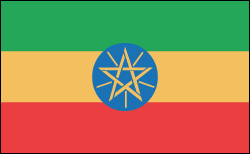- / Countries of the World
- / news and current events
Ethiopia News & Current Events

Index
- Ethiopia Profile
- History
- News and Current Events
War with Eritrea
Since Eritrea's independence, Eritrea and Ethiopia had disagreed about the exact demarcation of their borders, and in May 1998, Eritrea initiated border clashes that developed into a full-scale war that left more than 80,000 dead and further destroyed both countries' ailing economies. After a costly and bloody two-year war, a formal peace agreement was signed in Dec. 2000. The United Nations provided more than 4,000 peacekeeping forces to patrol the buffer zone between the two nations. An international commission defined a new border between the two countries in April 2002. Ethiopia disputed the new border, escalating tensions between the two countries once again. In Dec. 2005, an international Court of Arbitration ruled that Eritrea had violated international law in attacking Ethiopia in the 1998 war.
In 2003, in an effort to solve its chronic shortage of food and to lessen its dependence on international aid, Ethiopia began relocating 2 million farmers from their parched highland homes to areas with more fertile soil in the western part of the country. The largest relocation program in African history, however, has turned into a disaster. The majority of those resettled are still unable to support themselves, and, most alarmingly, much of the fertile regions where the farmers have been resettled are rife with malaria.
Ethiopia Lends Military Support to Neighbor Somalia
In June 2006, an Islamist militia seized control of the capital of neighboring Somalia and established control in much of that country's south. Ethiopia, which has clashed in the past with Somalia's Islamists and considers them a threat to regional security, began amassing troops on Somalia's border, in support of Somalia's weak transitional government, led by President Abdullah. In mid-December, Ethiopia launched air strikes against the Islamists, and in a matter of days Ethiopian ground troops and Somali soldiers regained of Mogadishu. A week later most of the Islamists had been forced to flee the country. Ethiopia announced that its troops would remain in Somalia until stability was assured and a functional central government had been established. Battles between the insurgents and Somali and Ethiopian troops intensified in March, leaving 300 civilians dead in what has been called the worst fighting in 15 years. Amid a growing threat from militant Islamists, Ethiopia began withdrawing troops from Somalia in January 2009. At this point, Somalia was far from stable. Indeed, Ethiopia's presence in Somalia sparked increased guerrilla warfare and even further weakened the transitional government. Many feared that the withdrawal, along with Somalia's political instability, would provide Islamists an opportunity to fill the power vacuum.
Prime Minister Meles Zenawi's Ethiopian People's Revolutionary Democratic Front won parliamentary elections by a wide margin in May 2010. The U.S. and the European Union said the vote failed to meet international standards, and the opposition refused to recognize the results. Nevertheless, parliament elected Zenawi to a fourth term.
Prime Minister Meles Zenawi Dies
In August 2012, Prime Minister Zenawi died at age 57 after a long illness. Zenawi had been in power since 1995. He is credited with lifting the country out of famine to the point that Ethiopia began exporting food, reducing poverty, increasing economic growth, and improving infrastructure. However, Zenawi was repressive and dictatorial, arresting and imprisoning activists, journalists, and members of the opposition. Relations between the U.S. and Ethiopia improved under Zenawi, with Ethiopia helping the U.S. combat Muslim militants in Africa. The U.S. gives Ethiopia some $800 million in aid annually. Hailemariam Desalegn, the minister of foreign affairs, succeeded Zenawi.
On October 7, 2013, Mulatu Teshome Wirtu became the fourth president of Ethiopia. He previously served as Deputy Minister of Economic Development and Cooperation, Minister of Agriculture, and Speaker of the House of Federation. He also served as the country's Ambassador to China, Japan and Turkey. He was elected president by Parliament. The vote was unanimous. Mulatu Teshome replaces Girma Wolde-Giorgis who could not seek re-election due to term limits.
ISIS Targets Ethiopian Workers; Ruling Party Stays in Power
In April 2015, members of the Islamic State killed about 20 migrant workers in Libya. The victims, believed to be Ethiopian Christians, were either shot or beheaded.
Preliminary results of May 2015 elections, gave the Ruling Ethiopian People's Revolutionary Democratic Front (EPRDF) a landslide victory. The opposition accused the EPRDF of voter intimidation. Voter turnout was high, about 90%.
See also Encyclopedia: Ethiopia .
U.S. State Dept. Country Notes: Ethiopia
